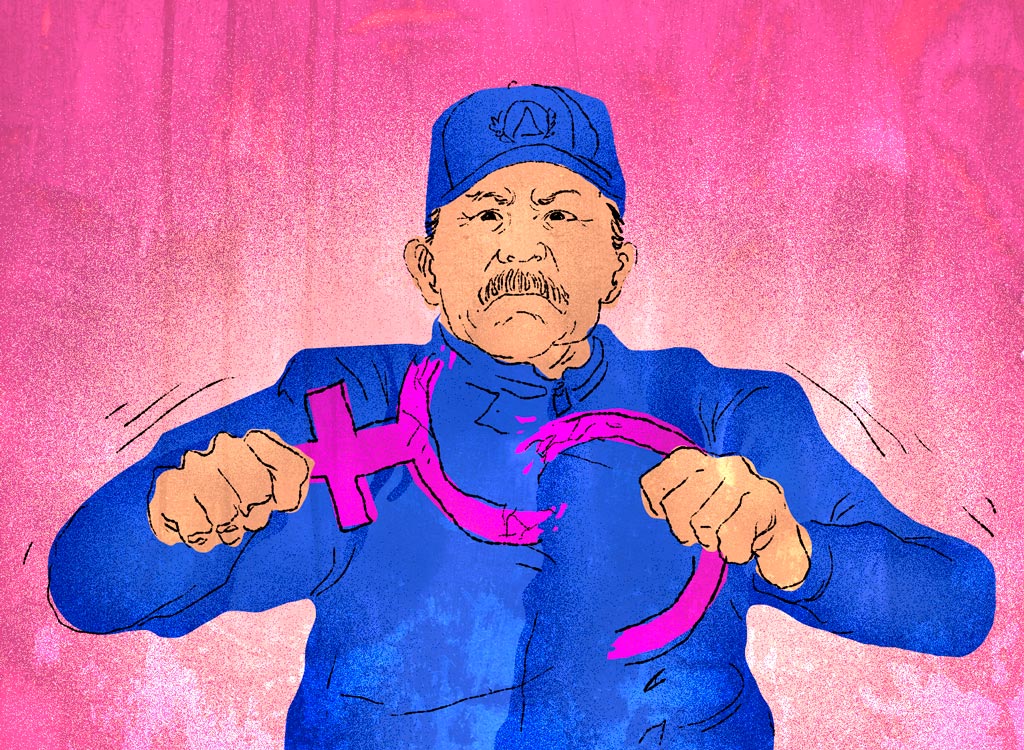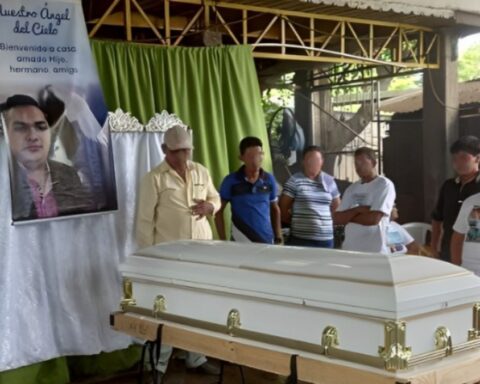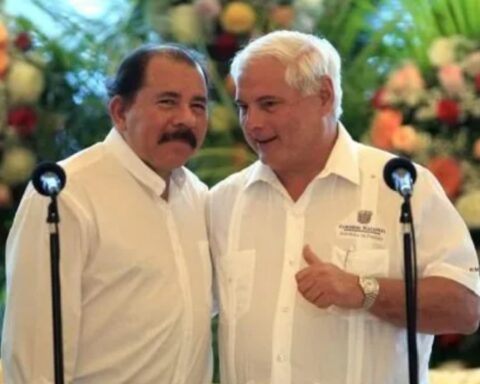On January 1, 2021, “Karla” was forced by her ex-partner to leave her home in Somoto, Madriz. If she refused, he would take her eight and nine year old daughters. Terrified, the woman agreed. Arriving at her new house, the man grabbed her from behind and placed a dagger on her neck in front of her daughters who screamed in horror. She fled because her eldest son, a 17-year-old teenager, appeared and facilitated the escape.
With fear running through her entire body, accompanied by her daughters, she arrived at the police station and after waiting about five hours to report her assailant, she left the police station trembling and with the promise of capturing him, but a year later, she still has not. be fulfilled. She slept for a few days at the house of a friend of hers, who was in charge of taking her to a feminist organization in the north of the country, which welcomed her as her family and sheltered her for nine months.
However, she was left without shelter when those responsible for the place told her that they had to move her as a precaution until the place woke up taken over by the Police, as had already happened with other NGOs.
“Karla”, 36, asks not to reveal her name because her life “is in danger”. She knew she was “going to die” that January 1st, she says.
She arrived at the shelter of the women’s organization at night, secretly. “It makes me very sad that they are going to close that place. There I received words of encouragement, ”she laments.
The NGO in charge of the shelter has not been canceled by the regime; however, as a preventive measure, the administrators decided to close the shelter to prevent the Police from arriving, or to annul their legal status.
267 NGOs closed in four years
At the end of 2018, the regime closed nine civil society organizations: it canceled their legal personality and confiscated their assets. During the following three years, the Ortega scythe reached more NGOs and there are already 267 organizations, foundations and associations cancelled, until last May 19, 2022.
Legally, the regime has used the approval of the Foreign Agents Regulation Law, at the end of 2020, which requires organizations to register as a “foreign agent” and complicates the processes to be legalized before the Ministry of the Interior (Migob). .
The bulk of the affected projects are of a social, educational and development nature. However, several of those had a gender component, focusing on women’s empowerment from different angles. When the organizations disappear, the beneficiaries are the hardest hit, left with unfinished programs, without access to training and completely unprotected.
Of the total number of illegal NGOs, 24 organizations worked directly in defense of women’s rights and their empowerment in Managua, Matagalpa, Nueva Segovia, Masaya, Granada, León and Chinandega, according to a count of CONFIDENTIAL.
Eight were annulled within a group of 50 organizations canceled in a single session of the National Assembly, dominated by the Sandinista Front, on May 4.
There is no consolidated information on how many organizations defending women’s rights were registered with the Ministry of the Interior; However, a piece of information that allows us to approach it is found in the Network of Women Against Violence, which before 2018 brought together 120 feminist and human rights NGOs and currently there are about 40, confirmed CONFIDENTIAL.
The reasons for its dismantling are several: a more hostile environment for defenders, who endure intimidation, abuse and raids by operators and the Police; lack of financing; repressive laws, migration and finally, the guillotine of the regime of Daniel Ortega and Rosario Murillo.
The NGOs, some with more than 30 years of work in Nicaragua, had shelters for women victims of sexist violence, provided medical assistance, psychological care and legal advice to victims of abuse in a country where the State has remained absent, according to the defenders.
Before 2018 there were 13 shelters in Nicaragua, which were run by feminist organizations. Since then, NGOs have faced problems accessing funds to cover operating costs. However, they were still standing.
With the social outbreak of 2018 and the repression unleashed by the Daniel Ortega dictatorship, the shelters were reduced to ten and gradually closed until there were none left; a process that was accelerated with the guillotine placed on feminist groups. The disappearance of these shelters directly affects cases like “Karla”, one of the 135 survivors of sexist violence in 2021, according to Catholics for the Right to Decide (CDD).
Matagalpa Women’s Collective
Eva Molina is a member of the Matagalpa Women’s Collective, an organization outlawed nine months ago, born in the context of the Sandinista Revolution. Its founders identified acts of violence in the ranks of the party, and it was thus that they sought their own spaces for feminist reflection. They began working with women in the cooperatives of Matiguás, Mulukukú, and Muy Muy, who suffered violence from the counterrevolutionaries—who were trying to overthrow Ortega by force of arms—and from the Sandinistas, says Molina.
In 1990, when Nicaragua opened up to democracy and Ortega was defeated by former president Violeta Barrios de Chamorro, the Collective began to consolidate its history through an educational program aimed at children, women and youth in rural and urban communities. They involved 17 women’s community organizations, responsible for a network of 14 “women’s houses”, through which they coordinated projects for the benefit of the community.
It was consolidated as a key NGO in the north of the country, one of the areas most affected by sexist violence, which in 2021 registered 71 femicides throughout the country; seven of these were registered in Jinotega; five in Matagalpa and four in Nueva Segovia, according to CDD. Defenders like Molina worked in this context, seeking to expand the violence care program that included emotional care, sexual and reproductive health care, and accompaniment in situations of risk.
In numbers, the NGO assisted some 10,000 people annually, at an average rate of 25 women a day, who sought care as victims of abuse at the hands of their partners or ex-partners. With the closure of the organizations ordered by the Government, the beneficiaries were adrift because, precisely, they attended the associations looking for answers that they did not find in the Police.
Molina explains that “people don’t believe in the Nicaraguan justice system,” neither do women. “They don’t feel listened to, they feel guilty, (they tell them at the police stations) go back to your aggressor, there’s nothing else you can do here… they’re also in danger.”
“We are helpless. We don’t have any kind of protection, we don’t have anyone to accompany us. We have nowhere to hold on, people tell you, ”she warns.
March 8 Collective
Last March, the legal status of the March 8 Women’s Collective, an organization with Sandinista roots, was annulled. It was legalized 26 years ago and focused its work in District Six and Seven of Managua and in seven communities in Esquipulas, Matagalpa.
Its flagship program was the fight against violence, which was summed up in care, prevention and shelter for women in situations of risk, along with the reproductive sexual health program. The shelter had capacity for about 20 people every three months, including women and children, explains one of its members who we will call “Lidia” for fear of reprisals. In the last five years, it is estimated that they protected some 600 people.
“That’s why we say that we also prevent femicides,” says the defender.
The shelter was specifically for women who were in danger. For three months, the women received psychological and medical attention and were helped with psychosocial work so that they could build their life plans, while the defenders tried to weave networks of solidarity around the victim so that when they left the shelter they would not be left without any help. support type.
The Collective assisted 10,800 women and 934 girls who experienced violence and some were victims of frustrated femicide in the last five years.
“The void is that, since the March 8 Collective does not exist, they know that there is no house where they will be cared for as a woman in a situation of violence should be cared for, where she will not be revictimized, where she will not be treated. to blame, where she has all the freedom to speak what she wants and her information will be confidential”, laments “Lidia”.
The House of the Bocana Woman of Paiwas
At the end of the eighties, Bocana de Paiwas, a municipality nestled in the South Caribbean, had become a refugee camp from the armed conflict. The founders of the Casa de la Mujer de Paiwas came from Sandinismo. Jamileth Chavarría is a pioneer feminist within the NGO, who joined peasant women in the area and dedicated herself to the defense of their sexual and reproductive rights, and the fight against sexist violence.
Over time, the Casa de la Mujer became a benchmark in the area, educating the population through the first cultural center and the radio Word of Women, which was distinguished by its program, “La Bruja Mensajera” —performed by Jamileth — in which they denounced the aggressors. The radio stopped being listened to since 2014, when the regulatory body (Telcor) blocked a request for it to be transmitted in modulated frequency (FM).
Previously, the NGO had been the target of attacks by sympathizers of the Sandinista Front, when they questioned Ortega during a visit he made to Paiwas in 2002. The organization was canceled on May 4.
The work of the NGO had decreased in recent years, but the defenders were still accompanying other women, says Chavarría from Spain, where she has lived since 2011, without cutting ties with Paiwas.
Women’s organizations were not born out of the blue, “they were born out of abandonment, legal and legal helplessness, because the State has never prioritized the situation experienced by each woman. That’s why we were born, to have an autonomous, independent response to this adverse situation,” says Chavarría.








